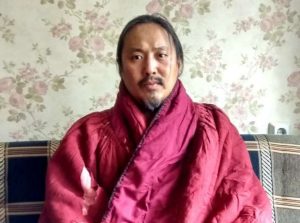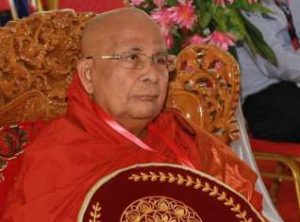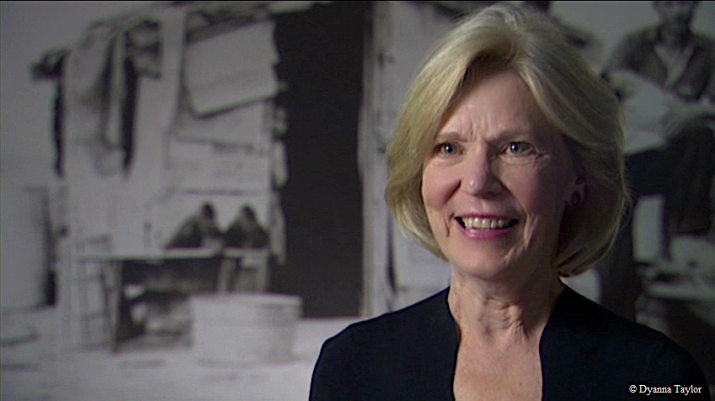
In Buddhist economics, people are interdependent with one another and with Nature, so each person’s well-being is measured by how well everyone and the environment are functioning with the goal of minimizing suffering for people and the planet. Everyone is assumed to have the right to a comfortable life with access to basic nutrition, healthcare, education, and the assurance of safety and human rights. A country’s well-being is measured by the aggregation of the well-being of all residents and the health of the ecosystem. — Clair Brown, Buddhist Economics, 2017.
A practicing Buddhist, a professor of economics at the University of California, Berkeley (UCB), and director of the Center for Work, Technology, and Society at UCB, Clair Brown has a formidable academic pedigree. She has published in-depth research into numerous aspects of how economies function, including standards of living, wage determination, inequality, sustainability, high-tech industries, and development engineering, and her Dharma-informed approach to life and economics has been featured in Eminent Economists II – Their Life and Work Philosophies (Cambridge University Press, 2013).
As the author of Buddhist Economics: An Enlightened Approach to the Dismal Science (Bloomsbury Press, 2017), Prof. Brown brings the seemingly disparate fields of the Buddhadharma and economics into confluence, presenting a holistic model of developmental and social sustainability with a Buddhist emphasis on interdependence, the value of human dignity, and quality of life.
Rather than suporting a reliance on market-based economics that encourages self-interest, endless consumption, and environmental exploitation, Prof. Brown advocates an evolution toward a sustainable economy that supports a comfortable, meaningful life for all members of society, incorporating a shared prosperity and values for a more equitable, compassionate, and happier world. But do we have the will to travel this path?
Buddhistdoor Global: Thank you for sharing your time with us, Prof. Brown. Could you talk a little about your personal background—your path to Buddhism and how the practice manifests in your daily life?
Clair Brown: I’ve been practicing Tibetan Buddhism for more than a decade, and daily sitting is an important part of my life. I grew up as an Episcopalian, and in my adult life I tried several spiritual practices, including different types of Buddhism. None of them sang out to me, until I started practicing with a Tibetan Buddhist Rinpoche, who opened a meditation temple in a former Episcopal church not far from my home. My sangha is especially important to me, both as friends and as spiritual activists. Because my practice includes prayers and activities to care for Mother Earth in this time of climate crisis, I often look to other Buddhist laypeople, because many Buddhist monastics do not make sustainability a part of their Dharma teachings.
Buddhistdoor Global: How did those experiences coalesce into your current focus on “Buddhist economics”—two terms that we seldom see paired in the same sentence!
Clair Brown: As an economics professor who has devoted a career to reducing inequality and making the economy work for all people, I became concerned with the way inequality has continued to increase over the past four decades. Then the crisis of global warming became our biggest challenge as the consequences of climate change are hurting communities and all beings around the world. To work on integrating equity and sustainability into an economic model, I started teaching a sophomore seminar, “Buddhist Economics,” that is built on the Buddhist concepts of the interdependence of people with each other and with the planet, and of acting with compassion to relieve suffering. The course has become very popular, and I’ve learned a lot from teaching it.
BDG: Buddhist Economics implies a strong emphasis on Right Livelihood. This appears to be a significant weak point in the economic models that most contemporary societies are built upon. How do you see this imbalance being addressed?
CB: The Buddha’s Four Noble Truths guide individual behavior in Buddhist economics. As you know, the fourth truth is that the Eightfold Path provides a way to live without suffering. The Eightfold Path includes three interrelated activities that directly involve economic activities: Right Action, Right Livelihood, and Right Effort. The three economic activities work together: Right Action means to do everything with mindfulness and compassion, without harming ourselves or others; this goes with Right Livelihood, earning a living without harming others while nurturing our good qualities; and these are part of Right Effort, which develops our wholesome qualities such as generosity, loving kindness, and wisdom, which are the antidotes to the three poisons—greed, anger, and ignorance.
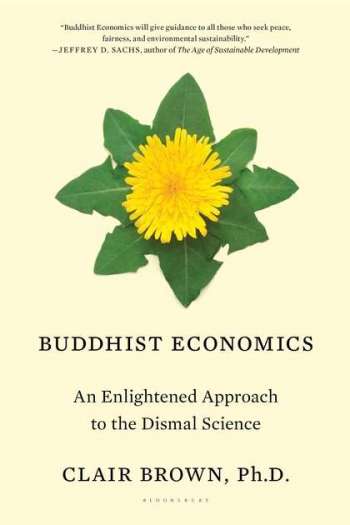
This way of life is compatible with most religions, and many societies teach “do no harm” and “care for others and the environment,” and good behavior includes generosity and kindness. Yet our competitive, or free market, economic system pushes consumerism, selfishness, and the domination of nature, and this leaves people suffering in a world out of balance. Buddhist economics pushes caring for others and the Earth, and relieving suffering, where our goal is maximizing the well-being of all instead of maximizing consumption and income.
BDG: Can these Buddhist principals be applied within the framework of modern free-market economics, or does it require a fundamental rethinking of how our economies and societies are structured?
CB: Buddhist economics focuses on caring for others and the Earth and relieving suffering, where our goal is maximizing well-being of all instead of maximizing consumption and income. In a Buddhist economy, the government provides social programs that provide healthcare, education, care for children and elders, and a social safety net, along with regulatory and tax policies that structure markets to deliver the desired outcomes. Company performance includes the well-being of workers, the community, and the environment as well as shareholders. Individuals live mindfully and care for each other and the planet.
Economists and climate scientists, along with Buddhist teachers, have already shown us the policies that achieve these goals. Buddhist economics brings together these proven policies, which cover a wide range of government, business, and individual actions, to create an economy and society with reduced inequality, that uses only renewable energy without carbon emissions, and that relieves global suffering. For example, Northern European countries take the lead in creating an equitable society. United Nations’ climate scientists have presented several roadmaps for every country to transition to renewable energy. The UN, with its sustainable development goals, has shown us how to reduce starvation and extreme poverty, and how to improve education and human rights globally.
We know how to move to a Buddhist economy. What we need is the political will coupled with the skillful means to create meaningful lives based on caring for one another and for the environment. Neuroscientists have shown that helping others makes us happy and has validated that buying more “stuff” does not lead to long-term happiness. Let’s turn off our devices and screens, stop being influenced by celebrities and advertisers, and enjoy our relationships and the world around us.
BDG: Modern economics, as it’s popularly understood, seems diametrically opposed to the idea of religious or spiritual practice, especially at the deeper level—I’m thinking in terms of their respective conceptual (and non-conceptual) understandings of reality and society. How can these two modes of thought be integrated?
CB: Yes, many reporters and media ignored my book because “we don’t do religion,” they would tell me. Although I have a Buddhist spiritual practice, I don’t think of Buddhist Economics as putting religion into economics. Rather it is expanding economics to incorporate caring for the human spirit and supporting people in pursuing a meaningful life. Our focus should be “what is meaningful to me?” and “how can I live my life in a meaningful way?” along with “how can our activities as people, companies, and nations take place in a regenerative economy that cares for and heals the Earth?”
BDG: Two core concepts of Buddhist economics that I took away from your book are interdependence and sustainability. The importance of the latter is being increasingly recognized, albeit much more slowly than we might like, while interdependence, interconnectedness seems to be a much more subtle and complex aspect of economics to introduce in a world where people are working in areas of increasing specialization in which their focus is becoming more detached from the bigger picture.
CB: Sustainability is based on our interdependence with the Earth, and I agree that people are finally realizing that an economy based on human domination of the Earth to increase consumption is depleting our natural resources and killing the planet as we know it. Because of the climate crisis, people are now realizing that our free market economic models based on selfishness and materialism are making our lives stressful and unhappy. When people feel interdependent with each other, and they help and care for each other, they become happier and live more worthy and meaningful lives. Aristotle’s teachings about happiness, along with those of the Dalai Lama, have been shown by neuroscientists to be true. This Buddhist economics approach is not incompatible in a world where people have specialized knowledge or work activities. What is important are the goals of our economy and society, and ensuring that we have a regenerative, caring economy.
BDG: Are there any societies that, in your view, are successfully implementing some of these principles in a sustainable, manageable way?
CB: Governments play an important role in creating a Buddhist economy because government policies and programs structure markets and determine how the economy works and performs. One problem for economic policies and systems is that most policies focus on one problem at a time—inequality, sustainability, hunger—rather than taking an integrated approach. For example, we see Sweden or Denmark with fairly equitable economies and happy people, along with a decoupling of the economy from carbon emissions. Yet these rich countries are not reducing wasteful or extravagant consumption, and their economies are not regenerative or sustainable because their standard of living uses more resources than the planet can regenerate or replenish. People in rich countries can reduce their lavish lifestyles and shift their focus from consumption to relationships and experiences. They can reduce work hours to have more time for what is meaningful to them. Then people in poorer economies can increase their consumption of basic goods and services in a sustainable world with shared prosperity. The health and well-being of people around the world will then improve.
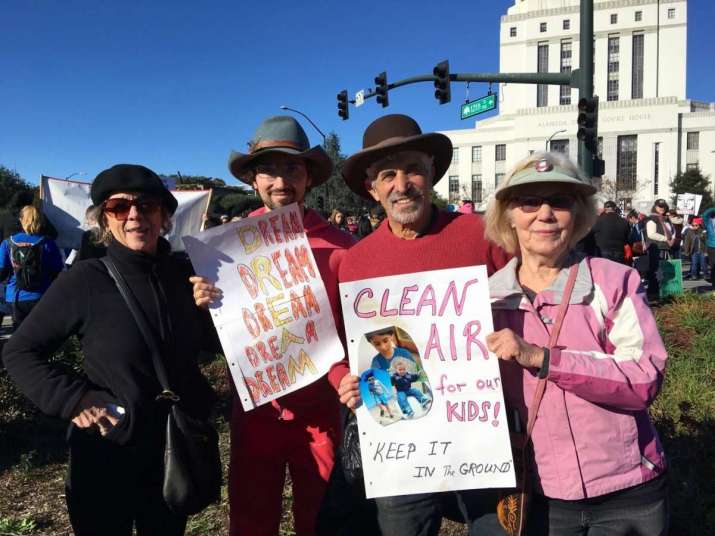
BDG: Having presented quite a comprehensive vision of a more sustainable and equitable model of economic development governed by Buddhist principles, how optimistic are you that such approaches will be implemented on a meaningful scale?
CB: I am optimistic for two reasons. First, people in communities around the world are coming together to create economies that work for them, and grassroots activists are leading the way toward Buddhist economics. Second, the climate crisis is making people realize that we are all interdependent with the planet and must act together to mitigate global warming. I feel that big business is having its last gasp in terms of dictating our energy, healthcare, and military policies, and that people are becoming politically active to take back their governments and to create the caring, regenerative economies they want and deserve. There is no silver bullet or no one right path, and what is happening at the community level around the world lifts my spirit.
One important step for people to take is to work together and take action. Each person can live mindfully with love, generosity, and wisdom, yet each of us must also join with others to create the world we want. Thich Nhat Hanh taught us: “The healing of our bodies and minds must go together with the healing of the Earth . . . Together, we can bring about real transformation for ourselves and for the world . . . We will survive and thrive together with our Mother Earth, or we will not survive at all.” Together we can change the way Big Business rules the economy, the way the elite obtains wealth and uses it to manipulate the system. To embrace Buddhist economics takes courage—courage to change, courage to create a regenerative economy, courage to promote justice, and courage to live with joy. May your readers join together in this lifetime commitment for the benefit of all.
References
Brown, Clair, Ph.D. 2017. Buddhist Economics: An Enlightened Approach to the Dismal Science. London: Bloomsbury Press.
Hanh, Thich Nhat. 2013. Love Letter to the Earth. Berkeley, CA: Parallax Press.
See more
Buddhist Economics
Buddhist Economics (Facebook)
Clair Brown (Twitter)




